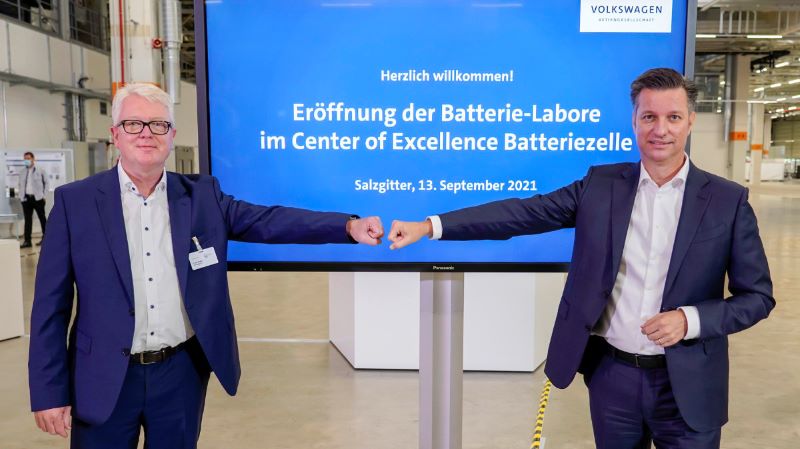Volkswagen Group Components today opened one of the most modern laboratories for cell research and development in Europe in Salzgitter. Thus, the company is further expanding its expertise in battery technology and taking the next step towards developing and producing its own battery cells for electromobility. From 2025 onwards, the Volkswagen unified cell is scheduled to roll off the production line in Salzgitter.
In the future, around 250 experts will conduct research in the areas of cell development, analytics and testing in a total of four laboratories. Volkswagen is investing around 70 million euros in the facilities.
“With the new, state-of-the-art laboratories, we are further expanding our development, process and production expertise for the battery cell – the heart of the battery electric vehicle. Volkswagen’s Salzgitter site demonstrates how the transformation of the German automotive industry from conventional drive systems to e-mobility can succeed. We are attracting cutting-edge researchers and, as a pioneer in the industry, create the jobs of tomorrow,” says Thomas Schmall, Group Board Member for Technology at Volkswagen AG and Chairman of the Board of Management of Volkswagen Group Components, who is responsible for the Battery and Charging Technology Roadmap across all brands in the Group. The roadmap was presented at the “Power Day” in March 2021, and the future technologies of battery and charging again came into focus as key areas of the Group’s NEW AUTO strategy in July.
“With the opening of the laboratories, we have reached the next strategic milestone. Now we are pushing ahead with preparations for our own cell production with all our strength,” says Thomas Schmall. The new unified cell for the volume segment is scheduled to roll off the production line at the Gigafactory in Salzgitter from 2025. By 2030, the Volkswagen Group plans to operate six cell factories in Europe together with partners with a production capacity of 240 GWh. Prospectively, cells with an annual capacity of 40 GWh will be produced in Salzgitter. The new unified cell is expected to unlock synergies and reduce battery costs by up to 50 percent.
Lower Saxony’s Minister President Stephan Weil said: “If there is one place in particular where you can currently observe what is meant by ‘transformation of the automotive industry’, it is Salzgitter. For decades, the VW plant in Salzgitter has supplied millions of vehicles with engines. With increasing electrification, there is now a consistent step-by-step conversion to future-proof and forward-looking battery cell production at the site. The heart of the automotive industry will beat electrically in the future. And it beats in Lower Saxony.”
The competence center in Salzgitter is responsible for Group-wide material testing, release testing, quality assurance and series monitoring of cells for electric car batteries. Of the approximately 500 employees at the Center of Excellence (CoE) Battery Cell in Salzgitter, around 160 are currently involved in cell development.
By the end of 2022, the CoE is expected to grow to more than 1000 employees, including around 250 experts for research, analysis and development of suitable cell materials and formats.
The new laboratories will enable extensive cell testing programs with up to 200 different analytical methods and the development of new formulations on an initial area of 2,500 square meters. “In the future, innovations for the cells of today and tomorrow will be created in Salzgitter,” explains Frank Blome, Head of the Battery Cell and Battery System Business Unit, “Its equipment makes the new laboratories one of the most modern facilities for cell research in Europe.”
Cutting-edge technologies are used here to put the cells through their paces. For example, Salzgitter has one of the world’s few scanning electron microscopes for detecting lithium. Other equipment includes a highly automated test field to test cells for performance and signs of aging during rapid charging and discharging. The test includes cells that can be charged from 5 to 80 percent battery power within 12 minutes.
Thanks to intelligent connection of production-, analysis- and test data-, the development processes are highly efficient. To ensure perfect interaction, the laboratories are split into four areas: In the cell development lab, new materials are evaluated for their suitability, and chemical formulations as well as electrode materials and processes are further developed. Promising innovations are sent directly from here to the pilot line next door for small-scale production.
In the analytics lab, researchers disassemble components and raw materials of the cells and perform competitive analyses as well as quality assurance.
In the environmental and safety laboratory, cells are subjected to endurance tests in six special chambers and subjected to electrical, thermal or mechanical stresses, for example. New test methods are also researched here.
In the electrical test field, laboratory and series cells of all formats and power classes are measured electrically and tested for performance, aging phenomena and long-term robustness.
“One of the most important future technologies for the Volkswagen Group is being driven forward here. Everything that is done at the Center of Excellence Battery Cell serves to provide customers of all Group brands with e-vehicles with the greatest possible range, charging performance, sustainability and safety,” explains Frank Blome.





















